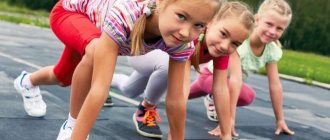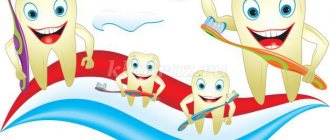Formation of healthy lifestyle skills in kindergarten
Formation of healthy lifestyle skills in preschool children in a preschool educational institution
Description of the material: I offer you an article on the formation of healthy lifestyle skills in preschoolers attending kindergarten on the topic “Formation of healthy lifestyle skills in preschool children in a preschool educational institution” . This material will be useful to parents of preschool children and teachers in preschool institutions. Preschool education is aimed at the formation of a general culture, the development of physical, intellectual, moral, aesthetic and personal qualities, the formation of prerequisites for educational activities, the preservation and strengthening of the health of preschool children.” / Federal Law of the Russian Federation “On Education in the Russian Federation” No. 273-FZ of September 1, 2013. Article 64 clause 1 Pre-school education. Preschool education is a very short period in a person’s life. Forming healthy lifestyle habits is one of the key goals in the preschool education system. And this is understandable - only a healthy child can develop harmoniously. Protecting and strengthening the physical and mental health of children, including their emotional well-being, is the main task of the Federal State Educational Standard for Preschool Education. Preschool age is decisive in the formation of the foundation of physical and mental health. Until the age of seven, a child goes through a huge developmental path that is not repeated throughout the rest of his life. It is during this period that intensive development of organs and the formation of functional systems of the body takes place, the main personality traits are laid, character and attitude towards oneself and others are formed. That is why, from an early age, it is necessary to involve a child in taking care of his health, to instill in him interest and activity in self-development and self-preservation. Work in this direction is only advisable together with the family , since the important subject of the initial link of the system is the family. It creates conditions for the primary orientation of children in organizing a healthy lifestyle. The family urgently needs the help of specialists at all stages of preschool childhood. It is obvious that family and kindergarten, having their own special functions, cannot replace each other and must interact for the sake of the full development of the child. The main task of the educator and parents in introducing a healthy lifestyle is to form a reasonable attitude towards their body, teach them to lead a healthy lifestyle from early childhood, and master the necessary sanitary and hygienic skills. Parents should support at home the principles of developing a healthy lifestyle in optimal combination with all health-saving measures carried out in kindergarten. The habit of a healthy lifestyle is the main, basic, vital habit; it accumulates the result of using the available means of physical education for preschool children in order to solve health, educational and educational problems. Therefore, the preschool institution and the family are called upon to lay the foundations of a healthy lifestyle in preschool childhood, using various forms of work. It is in the family, in a preschool educational institution at an early stage of development that a child should be helped to understand the enduring value of health as early as possible, to realize the purpose of his life, to encourage the child to independently and actively form, maintain and increase his health. A healthy lifestyle is not just the sum of acquired knowledge, but a lifestyle, adequate behavior in various situations. Children may find themselves in unexpected situations on the street and at home, so the main task is to develop their independence and responsibility. Everything we teach children, they must apply in real life. The formation of cultural and hygienic skills in preschool children is one of the most important in raising children of this age. And how well it is initially thought out, planned and organized depends on whether it will promote health, physical and mental development, as well as fostering a culture of behavior. Hygienic culture is as important for a person as the ability to speak, write, and read. Self-care gives a person a feeling of cleanliness and health. It is necessary to accustom the child to hygienic individualism: his own comb, his own bed, his own potty, his own handkerchief, his own towel, his own toothbrush. Bring children to understand that keeping their body clean is important not only to protect their personal health, but also the health of others. In kindergarten, the teacher teaches students to take care of their health and the health of others, develops personal hygiene skills, gives knowledge about healthy food, and guides children towards a healthy lifestyle. Ways to solve problems: direct educational activities, games-activities, visual arts, walks, hygiene procedures, hardening activities, games, sporting events, holidays, conversations, reading literature, the use of emotionally attractive forms. Training should be organized not only in the classroom, but also in all routine moments when situations arise that prompt children to make a decision about this problem. Undoubtedly, parents should be the main allies in this work. From the first days of meeting them, the teacher shows and tells everything that awaits their children in kindergarten, paying special attention to issues related to the children’s health. Listens to their requests regarding the child’s food, sleep, and clothing. All medical and hardening procedures are carried out only strictly with the consent of the parents. First of all, we should direct the work and prove that without their participation we will not be able to achieve good results, only they are the brightest example for their children. Family and kindergarten are two educational institutions , each of which has its own special content and gives the child a certain social experience. For these purposes, various forms of cooperation are widely used: conversations, consultations, seminars, parent meetings, joint holidays, surveys. Conducting open days with demonstrations of methods and techniques of working with children, showing different types of physical education activities with preschool children. Involving parents to participate in the life of the kindergarten. Colorful visual stands introduce parents to the life of a kindergarten, the Convention on the Rights of the Child, and the age characteristics of children. In the corners for parents there is practical information using interesting facts, recommendations from the teacher and specialists. As a result of such work, using various forms and methods of communication with parents, the pedagogical literacy of parents increases; The culture of interpersonal interaction between children in kindergarten is improving. Thus, working in close cooperation with parents on the issue of developing a healthy lifestyle in preschool brings positive results , the proposed ways on this issue are effective and allow us to solve one of the most important tasks prescribed by the federal state standard of preschool education.
We recommend watching:
Formation of a healthy lifestyle in preschool children through valeology Conversation with game elements, for children of the senior group on the topic: Healthy lifestyle Health-saving technologies in the development of preschool children through outdoor games Conversation for children of the preparatory group. Tuberculosis Day
Similar articles:
Proverbs and sayings for preschool children about health
Word games on a sports theme for older preschoolers
Conversation “Good and bad habits” in the senior group
A healthy lifestyle for preschoolers: what it should be
Formation of the foundations of a healthy lifestyle in preschool children
It should be noted that currently there is a low level of knowledge about the value of parents’ health and the health of their children. As you know, health most often depends on lifestyle, and a little less on the environment. Heredity and the state of health care in the country have a much lesser impact on the health of a generation. Therefore, the task of parents and teachers is to instill in preschoolers respect for their own health and the responsibility to take care of it. And start forming the foundations of a healthy lifestyle in preschoolers as early as possible.
During the preschool period, there is intensive development of organs and the formation of functional systems of the body. It is very important at this time to provide children with a certain base of knowledge and practical skills of a healthy lifestyle, to create the need for regular and systematic physical education and sports.
Since a healthy lifestyle is understood as active human activity aimed at maintaining and improving health, this activity should include such components as proper nutrition, rational physical activity, hardening the body and maintaining a stable psycho-emotional state. It is these components that should form the basis of a healthy lifestyle for a preschooler.
Regime, child's daily routine
Mainly in the formation of the foundations of a healthy lifestyle in preschoolers and the correct attitude towards their health in preschoolers are appropriate games, watching films, cartoons, reading and discussing fiction, quizzes, walking, health days, sports events. It is precisely such events that are most interesting for children, and in this process it is more productive to form the necessary attitude towards a healthy lifestyle in preschoolers.
In the course of physical education and health work, namely physical education minutes, health minutes, motor exercises, elements of relaxation, etc., the physical, mental and moral qualities of children are laid, independence and creativity are nurtured.
It is necessary to pay serious attention to cultural and hygienic skills, to form habits of proper washing, wiping, caring for the oral cavity, using a handkerchief, and proper behavior when coughing and sneezing.
It is necessary that children have the opportunity to move systematically. To do this, you need to promote the development of basic motor skills and maintain performance at a high level throughout the day. However, it must be taken into account that a healthy lifestyle for preschoolers involves alternating active and quiet games, so a reasonable balance between physical activity and rest must be maintained.
MAGAZINE Preschooler.RF
“Features of developing healthy lifestyle habits in children aged 3-4 years” (report from work experience)”During preschool childhood, the foundations are laid for the child’s conscious desire for a healthy lifestyle, self-knowledge, formation, strengthening and maintaining a culture of health.
The educational field “Physical Development” is aimed at preserving and strengthening the health of children and has the following directions: introduction to physical education, development of psychophysical qualities, introduction to sports and outdoor games, development of interest in sports, as well as the formation of healthy lifestyle values, mastering it basic norms and rules, education of cultural and hygienic skills, useful habits.
In the Federal State Educational Standard for Preschool Education (FSES DO), physical development is considered as one of the educational areas aimed at protecting and strengthening the physical and mental health of children, including their emotional well-being.
According to WHO definition, health is a state of complete physical, mental and social well-being, and not just the absence of disease and physical defects.
Over the past decades, the problem of forming a healthy lifestyle has been the object of study by many researchers (A. I. Antonov, G. A. Butko, I. V. Zhuravleva, Yu. P. Lisitsyn, A. A. Pokrovsky, G. I. Tsaregorodtsev, etc.) . Few studies are devoted to the problem of studying the formation of ideas about a healthy lifestyle and the cultivation of healthy lifestyle habits (N.A. Andreeva, N.G. Bykova, L.G. Kasyanova, E.V. Kupavtseva, M.V. Melicheva, etc.).
A healthy lifestyle (definition by I.I. Sokovnya - Semenova) is a system of relationships between a person and himself and environmental factors, which constitutes a complex of actions and experiences, the presence of useful habits, strengthening the natural resource of health.
A healthy lifestyle includes mental health, avoiding tobacco and alcohol consumption, healthy eating patterns, physical activity, exercise, and sports. The health culture of preschool children is the totality of a person’s value attitude towards health, its preservation and strengthening at the level of oneself, others and society as a whole, personally and socially significant ways of activity aimed at achieving physical, mental and social well-being, the absence of diseases.
Let's consider the mechanism of forming the prerequisites for a healthy lifestyle in preschoolers 3-4 years old.
At the age of 3-4 years, children develop an idea of the value of health; a desire is formed not to get sick, to be healthy, children learn what a “healthy lifestyle” and why they should strive for it; children will learn about healthy (vegetables, fruits, dairy products, etc.) and unhealthy foods (sweets, cakes, sweet carbonated drinks, etc.); they will learn about the benefits of hardening, morning exercises, sports and outdoor games, physical exercise (you won’t get sick, you will be strong and agile, etc.); good sleep (in sleep a person grows, regains strength, if you don’t get enough sleep, you will be in a bad mood, tired, etc.); children become familiar with exercises that strengthen various organs and systems of the body.
Children learn to report their well-being to adults, to realize the need to see a doctor if they become ill, and to get treatment.
Children also learn to take care of their appearance; It is important to teach at this age to perform all hygiene procedures (wash hands with soap, use a handkerchief, comb, toothbrush; develop basic table manners: eat carefully, use a spoon, fork, napkin correctly, do not crumble bread, do not talk during meal).
A kindergarten creates conditions that guarantee the protection and promotion of health, but we should not forget about the role of the family in promoting the health of children. Article 44 of the Law of the Russian Federation “On Education” states: “Parents have a preferential right to the education and upbringing of children. They are obliged to lay the foundations for the physical, moral and intellectual development of the child’s personality .
The interaction between the physical education instructor and parents is aimed at developing parents’ knowledge about the formation of the foundations of a healthy lifestyle through joint activities.
In joint activities with my parents I. As a physical education instructor, I solve the following problems:
- promotion of healthy lifestyles
- educating parents to improve their pedagogical knowledge
- study, generalization and dissemination of positive experiences of family education
- involving parents in the development of a healthy lifestyle
- involving parents in joint holidays and entertainment.
I build joint work with my family on the issue of forming the foundations of a healthy lifestyle on the following basic principles:
- unity of actions of teachers and parents (the family is familiar with the basic content, methods, and techniques of physical education and health work, and teachers use the best experience of family education)
- systematic and consistent work in the formation of a healthy lifestyle
- a personality-oriented approach to each child, to each individual family
- mutual trust and mutual assistance of teachers and parents.
The teacher is the link between me, as a physical education instructor, and parents. I conduct consultations, conversations, speak at parent-teacher meetings, conduct master classes, and design visual materials.
In my work I use the following forms of working with parents:
- questionnaire ( “Formation of the foundations of a healthy lifestyle in the family” , “About a healthy lifestyle” )
- consultations ( “Health Secrets” , “Recommendations of a Physical Education Instructor” , etc.)
- wall newspaper ( "Healthy lifestyle" )
- “workshop” - production of non-standard physical education equipment, - planting green beds (seasonal planting of onions and garlic)
- master classes for parents ( “Health is fine - thanks to exercise” , “This world of outdoor games” )
- The electronic newspaper for parents “Zdoroveyka” contains material on maintaining and promoting health.
Due to the epidemiological situation, there is a need to select new forms and methods of interaction with parents. I began to actively use the WhatsApp messenger, email, social networks “VKontakte” and “Instagram” .
Thus, through various forms of joint activity, the solution to the problems of forming the foundations of a healthy lifestyle in the family is achieved.
Health-saving technologies are technologies aimed at solving the problem of preserving, maintaining and enriching the health of the subjects of the pedagogical process: children, teachers and parents.
The goal of health-saving technologies is to provide a preschooler with the opportunity to maintain mental and physical health, to develop in him the necessary knowledge, skills, and habits for a healthy lifestyle.
In preschool childhood, the main type of children's activity is play, and therefore health-saving technologies are of a playful nature. In my work I use technologies used to stimulate and maintain the health of children, such as:
- outdoor games (in addition to the development of physical qualities and the acquisition of motor skills, in outdoor play the body is healed due to the emergence of positive emotions that arise during the game and have a beneficial effect on the child’s psyche)
- games - fun
- finger gymnastics (mastering fine motor skills, developing speech, increasing brain performance, developing mental processes: attention, memory, thinking, imagination, developing tactile sensitivity, relieving anxiety)
- elements of breathing exercises (restoring breathing after running, jumping: exercise “Let’s inflate a ball” , “Deep breathing” , “We are growing” ).
In the game, knowledge is formed, consolidated, and the motivation for independent cognitive activity develops.
Knowing the psychological characteristics of children 3-4 years old, you can form useful habits. Work in this direction should be systematic, have a scientific basis, and should be interesting to children.
The ultimate goal of physical education and health work in general is to form the habit of a healthy lifestyle. Children will develop the following knowledge system:
- health as the main value in life
- about maintaining a daily routine
- about proper nutrition and its importance, healthy and harmful foods
- about the need to observe personal hygiene rules
- sun, air and water are important components of a healthy lifestyle.
Improving the health of children is one of the most promising areas for improving the health of the entire society. Therefore, caring for the health of preschool children is the most important responsibility of the kindergarten, the individual teacher and the family.
Barinova A.I. physical education instructor
| Next > |



